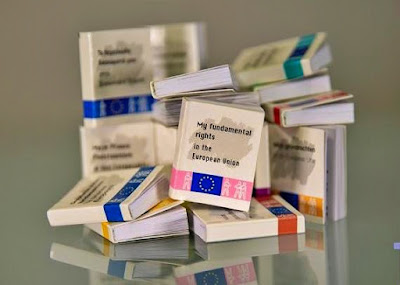Viewpoint: Do you know your Fundamental Rights?
The 10th anniversary of the European Charter of Fundamental Rights was marked on 1 December, writes Brian Byrne. What does that have to do with Kilcullen? Nothing, on the face of it, and yet, everything.
The Charter encompasses the ideals underpinning the EU — the universal values of human dignity, freedom, equality and solidarity, which have created an area of freedom, security and justice for people based on the principles of democracy and the rule of law.
Its roots go back to 1950 when the European Convention for the Protection of Human Rights and Fundamental Freedoms was adopted. But the Charter of today came into effect with the Lisbon Treaty on 1 December 2009. It is legally binding in every EU member state.
The Charter comprises 54 articles that ensure the rights of EU citizens in the areas of dignity, freedoms, equality, solidarity, citizens' rights and justice. Recent inclusions are rights on data protection, guarantees on bioethics, and the requirement for transparent administration. An example of rules so generated is the General Data Protection Regulation. Upcoming additions include EU protection of whistleblowers who report breaches of EU law, which will enter into force in 2021.
MEPs approved measures to promote free and fair elections in March 2019, introducing sanctions to European political parties if they misuse people's data during an election campaign.
The European Commission also agreed a code of conduct on countering illegal hate speech online, with Facebook, Microsoft, Twitter, Youtube and other digital companies.
Bottom line, while the Charter is about all of the above, fundamentally it is about you and me, our community and our country. Which does indeed make that 10th anniversary relevant to Kilcullen.
And, while it might seem that all this can be left to our elected representatives to deal with, the Charter only works if we, the people it is designed to protect, make sure they're doing it. For that, we need to know at least the basics.
You can learn more here.
Photographs use Policy — Privacy Policy
The Charter encompasses the ideals underpinning the EU — the universal values of human dignity, freedom, equality and solidarity, which have created an area of freedom, security and justice for people based on the principles of democracy and the rule of law.
Its roots go back to 1950 when the European Convention for the Protection of Human Rights and Fundamental Freedoms was adopted. But the Charter of today came into effect with the Lisbon Treaty on 1 December 2009. It is legally binding in every EU member state.
The Charter comprises 54 articles that ensure the rights of EU citizens in the areas of dignity, freedoms, equality, solidarity, citizens' rights and justice. Recent inclusions are rights on data protection, guarantees on bioethics, and the requirement for transparent administration. An example of rules so generated is the General Data Protection Regulation. Upcoming additions include EU protection of whistleblowers who report breaches of EU law, which will enter into force in 2021.
MEPs approved measures to promote free and fair elections in March 2019, introducing sanctions to European political parties if they misuse people's data during an election campaign.
The European Commission also agreed a code of conduct on countering illegal hate speech online, with Facebook, Microsoft, Twitter, Youtube and other digital companies.
Bottom line, while the Charter is about all of the above, fundamentally it is about you and me, our community and our country. Which does indeed make that 10th anniversary relevant to Kilcullen.
And, while it might seem that all this can be left to our elected representatives to deal with, the Charter only works if we, the people it is designed to protect, make sure they're doing it. For that, we need to know at least the basics.
You can learn more here.
Photographs use Policy — Privacy Policy






























